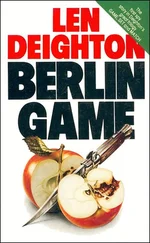Len Deighton - XPD
Здесь есть возможность читать онлайн «Len Deighton - XPD» — ознакомительный отрывок электронной книги совершенно бесплатно, а после прочтения отрывка купить полную версию. В некоторых случаях можно слушать аудио, скачать через торрент в формате fb2 и присутствует краткое содержание. Жанр: Триллер, на английском языке. Описание произведения, (предисловие) а так же отзывы посетителей доступны на портале библиотеки ЛибКат.
- Название:XPD
- Автор:
- Жанр:
- Год:неизвестен
- ISBN:нет данных
- Рейтинг книги:4 / 5. Голосов: 1
-
Избранное:Добавить в избранное
- Отзывы:
-
Ваша оценка:
- 80
- 1
- 2
- 3
- 4
- 5
XPD: краткое содержание, описание и аннотация
Предлагаем к чтению аннотацию, описание, краткое содержание или предисловие (зависит от того, что написал сам автор книги «XPD»). Если вы не нашли необходимую информацию о книге — напишите в комментариях, мы постараемся отыскать её.
XPD — читать онлайн ознакомительный отрывок
Ниже представлен текст книги, разбитый по страницам. Система сохранения места последней прочитанной страницы, позволяет с удобством читать онлайн бесплатно книгу «XPD», без необходимости каждый раз заново искать на чём Вы остановились. Поставьте закладку, и сможете в любой момент перейти на страницу, на которой закончили чтение.
Интервал:
Закладка:
‘Right,’ said Kalkhoven, ‘But at least they won’t be transmitting until we switch them on. These are good sets. They’re small because they take their power off the mains supply and use the wiring as far as the junction box as an antenna. They’re old but they’re good. I’ve got no time for some of this space wars junk that the Technical Services Division has developed; it goes on the blink too often. You done that one? Now do the other room. And don’t get jumpy. We got all the time in the world. We get anyone showing up here and Pete outside will hold them off. Pete’s a good guy.’
From the landing outside, Pete was watching the street where a uniformed police sergeant walked as far as the grocery, helped himself to an apple and stood eating it while watching the traffic pass. He was not one of the regular precinct cops; he was a nursemaid sent from police HQ to watch over such capers.
The kids had abandoned their efforts to get the fire hydrant going. The cop studied the chess game for a moment. ‘He’s going to take that bishop,’ he advised.
The old man who was the subject of this good advice gave the officer no word of appreciation. ‘Why don’t you go find Dillinger?’ he asked.
‘Come on, pop,’ said the police sergeant good naturedly, “The FBI got Dillinger back in the thirties. You’re smart enough to know that.’
‘So why wouldn’t I know how to play my bishop?’ said the old man.
The decline of the US dollar in world money markets during 1979 played havoc with Edward Parker’s budgets and plans. Suppliers in Taiwan and South Korea had contracts expressing their payments in Japanese yen, but virtually all the companies buying Parker’s radio components were in the United States and Canada. Now Parker was being squeezed by the movements of the world’s economy. His profit margin was getting thinner day by day and he knew that, unless some miracle happened within a year, he would have to start laying off workers at his assembly plant. If he was eventually going to be forced to a closure, he knew it would be better to face that fact sooner rather than later. He had seen what happened to other businesses where the management had refused to face the facts; the results had been total tragedy for everyone concerned. One man he knew, until recently a senior partner in a small but profitable radiophone company in Michigan, was working as a gas station manager in Ohio and, let’s face it, gas stations were not a growth industry. Poor man.
‘He complains all the time. He was always like that. In the army he was the same way,’ said Kleiber.
Parker wrenched his mind away from the capitalist problems that faced him in his business affairs. Truth to tell, he had become obsessed with the technical tasks of capitalism. He had to remind himself that he was the USSR ’s illegal resident and, whatever happened to his radio components company, Moscow Centre would demand that his espionage work be exemplary. He concentrated his mind upon the man sitting opposite him in this seedy New York apartment. He was a plump, cocksure man with a cropped head and ready smile. Willi Kleiber was not someone Edward Parker would choose as a dinner companion but he was one of his best agents, and they were on the brink of a success that might well enable Parker to go back to Moscow in a haze of vodka fumes and accompanied by the sound of clinking medals.
‘Who complains all the time?’ said Parker.
The light was orange. It was evening and the dying sun was huge and pincered between the tall buildings. Outside in the street some boys were playing softball on a diamond marked in chalk. They could hear their shouts.
‘Max Breslow complains all the time,’ said Kleiber, looking at Parker with narrowed eyes and wondering why his boss was so slow to comprehend him. ‘The joke of it is that Böttger’s people have encouraged him to continue making this film. Once they had seen the script, and decided it was harmless, they told him to actually go ahead and make this damned film.’ Kleiber laughed. He wrinkled his nose as he did it. The sound was more like a snigger than the sort of belly-laugh one would expect from this jack-booted German rowdy, thought Parker, but he allowed himself a smile.
‘There is no chance that Breslow guesses you are working for the Soviet Union?’ Parker looked at his watch. It was 6.10 p.m. He must catch a plane back to Chicago in time to do some paperwork before going to bed. At one time the illegal resident had always lived in Canada, but Parker had pressed Moscow Centre to let him be in the USA. Because he travelled so much of the time, they reluctantly agreed.
Kleiber laughed. ‘My old comrade Max would challenge you to a duel if you suggested such a thing.’ They were speaking English. Kleiber’s English was heavily accented compared with Parker’s, but Kleiber prided himself on his command of languages and Parker was wise enough to indulge his agent’s ego.
‘And what of Böttger and these other madmen? Are you sure they have no suspicions that you are working for the Soviet Union?’ His lungs gurgled on the humid air. Parker removed his jacket and loosened his tie. He detested these New York City summers. The buildings trapped the damp, stale air and made the ugly sounds of the streets unnaturally loud.
Kleiber grinned. ‘Eddie, Eddie, Eddie,’ he called in a lilting tone that mocked Parker’s caution. ‘Böttger, Rau and the others are senile, my friend. Crazy!… Meschugge!… Nuts!… Loco rematado! … I tell you this over and over again, but still you don’t believe me. Listen Eddie, these old fools are going through their second childhoods. They are liberals, they think I am a liberal, they don’t suspect me of anything. Now quit worrying, will you?’
But Parker did not quit worrying. He was a worrier by nature and he had mixed feelings about Kleiber. Kleiber’s loyalty to Moscow Centre was never in doubt, but then he would have given equal loyalty to any organization that gave him a realistic opportunity to relive something of his wartime life. He was as hard and fit as many men half his age, and as dispassionate as a machine. He was intelligent and, judging from what Parker knew of Kleiber’s security organization, a shrewd businessman. But for his weaknesses-women and gambling-he would by now have been wealthy. But Kleiber did not want to be wealthy. Kleiber was in love with hardship.
‘And Breslow will make money from the film,’ said Kleiber. He laughed again. He seemed to think it was genuinely funny. Obviously he had no resentment about the money that Breslow would make. Parker noted that; it was unusual in a man.
Parker said, ‘General Zhadov has ordered that the Stein documents are top priority. Nothing must stand in the way of our getting them.’ Parker had always used the name Zhadov-his old commander in the Fifth Army-to personify the whole bureaucratic empire of Moscow Centre and any orders or instructions emanating from it. But this time Parker had General Shumuk in his mind when he said it. ‘And General Zhadov,’ Parker added, ‘is a very tough cookie who doesn’t get his priorities wrong.’
Kleiber smiled. ‘You tell your General Zhadov to get stuffed,’ he said. ‘I’ll get the Stein documents, and I’ll get them my way. And it won’t be because some senile old fart in Moscow Centre tells me it’s a top priority.’ The air was heavy and unmoving. Somewhere on the other side of the city they heard a police siren wailing.
Parker said nothing, although for a moment he relished the vision of Kleiber confronting General Shumuk. Parker knew that Shumuk had accounted for tens of thousands of Kleibers in his time. He would be trampled underfoot without pause.
‘You’ll end up a general there someday, Willi,’ said Parker, ‘then you’ll change your tune.’ It was the standard Moscow line for outstanding agents. You gave them medals and military ranks. Once, Parker had gone to all the trouble of getting a Russian colonel’s uniform, complete with orders, medals and all the trimmings, just to show it to a nasty little computer programmer in Kansas City who was stalling with material that Moscow Centre kept demanding. The uniform did the trick; the programmer paraded in front of a mirror with it. The following year Parker promoted him again and the little jerk responded by wanting to go to Moscow for a visit. What a fiasco that would have been. Luckily the little fellow’s employer lost his War Department contract, so that he was no longer handling material that Moscow wanted; sudden reduction in rank! Parker smiled at the thought of it.
Читать дальшеИнтервал:
Закладка:
Похожие книги на «XPD»
Представляем Вашему вниманию похожие книги на «XPD» списком для выбора. Мы отобрали схожую по названию и смыслу литературу в надежде предоставить читателям больше вариантов отыскать новые, интересные, ещё непрочитанные произведения.
Обсуждение, отзывы о книге «XPD» и просто собственные мнения читателей. Оставьте ваши комментарии, напишите, что Вы думаете о произведении, его смысле или главных героях. Укажите что конкретно понравилось, а что нет, и почему Вы так считаете.












